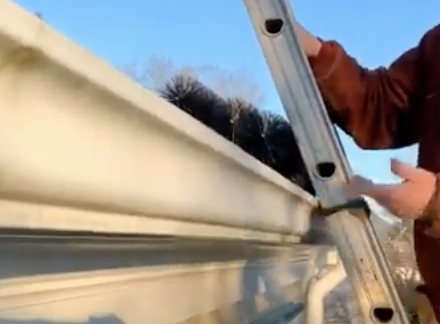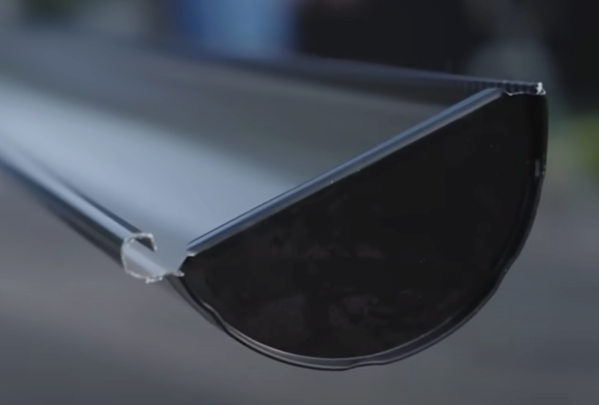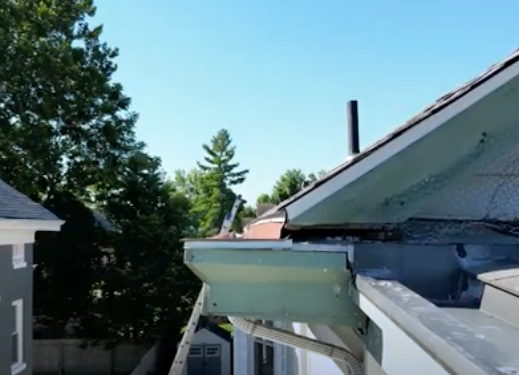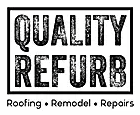New Paragraph
Nashville Gutter Services
Gutter Installations, Repairs, Guards, Cleaning & More
Gutters are often overlooked when it comes to the overall maintenance and functionality of a roofing system. However, they play a crucial role in protecting your home from water damage and maintaining its structural integrity.
Gutters are an essential component of any roofing system, and here's why they are important:
Water diversion: The primary function of gutters is to divert rainwater away from your roof and foundation. Without gutters, rainwater would pour off the roof and create a waterfall effect, causing erosion around the foundation. Over time, this can lead to foundation cracks, basement flooding, and even structural damage. Gutters ensure that water is directed away from your home, preventing these issues and keeping your foundation intact.
Preventing roof damage: Gutters help to protect your roof by channeling water away from its surface. When rainwater accumulates on the roof, it can seep into the shingles, causing them to deteriorate and eventually lead to leaks. This can result in costly repairs or even the need for a full roof replacement. By collecting and redirecting rainwater, gutters prevent excessive water exposure to your roof, prolonging its lifespan and preserving its integrity.
Preventing landscape erosion: When rainwater pours off the roof without gutters, it can create channels in your landscaping, leading to soil erosion. This can damage your plants, flowers, and even your lawn. Gutters collect rainwater and direct it away from your landscaping, preventing erosion and maintaining the beauty and health of your outdoor spaces.
Protecting the exterior of your home: Without gutters, rainwater can splash against the exterior walls of your home, causing staining, mold growth, and even rotting of the siding or paint. Over time, this can lead to costly repairs and decrease the curb appeal of your property. Gutters collect rainwater and ensure it is safely diverted away from the exterior of your home, protecting its appearance and structural integrity.
Preventing basement flooding: A properly functioning gutter system helps to prevent basement flooding. When rainwater is not effectively directed away from your home, it can seep into the ground and find its way into your basement. This can lead to water damage, mold growth, and the need for expensive repairs. Gutters play a crucial role in keeping your basement dry and protecting your home from water-related issues.
Gutters are an integral part of the roofing system, and their importance should not be underestimated. By investing in a well-maintained gutter system, you can protect your home, prolong the lifespan of your roof, and ensure the overall structural integrity of your property.
Gutter Repairs vs. Gutter Replacement
Over time, gutters can deteriorate and develop issues that may require either repair or replacement. If you're unsure whether your gutters need to be repaired or replaced, here are some factors to consider:
Age of the gutters
The age of your gutters is a crucial factor in determining whether they need repair or replacement. Most gutters have a lifespan of around 20 years. If your gutters are approaching or have exceeded this timeframe, it may be time to consider replacing them. Older gutters are more prone to rust, leaks, and other issues that can compromise their functionality.
Visible damage
Inspect your gutters for any visible damage, such as cracks, holes, or sagging sections. Small cracks or holes can sometimes be repaired, but if the damage is extensive or widespread, it may be more cost-effective to replace the entire gutter system. Additionally, if your gutters are sagging or pulling away from the roofline, it indicates structural damage that may require replacement.
Water overflow
During a rainstorm, observe how water flows through your gutters. If you notice excessive water overflow, especially in certain sections, it may indicate a clog or a problem with the gutter system's slope. In some cases, a simple cleaning or adjustment can resolve the issue. However, if the problem persists, it may be a sign that the gutters are not functioning properly and need to be replaced.
Rust and corrosion
Over time, gutters can develop rust and corrosion, especially if they are made of metal. Rust can weaken the gutters and lead to leaks and structural damage. If you notice significant rust or corrosion, it may be necessary to replace the gutters to ensure proper functionality and prevent further deterioration.
Foundation issues
If you notice water pooling around the foundation of your home or signs of foundation damage, it could be a result of faulty gutters. Gutters that are not effectively diverting water away from the foundation can lead to water seepage, which can cause cracks and damage. In such cases, it's important to address the gutter issues promptly, either through repair or replacement, to prevent further damage to your foundation.
Frequent clogs
If your gutters frequently get clogged with leaves, debris, or other materials, it may be a sign that they are not functioning optimally. While occasional clogs can be resolved with regular cleaning, if clogs occur frequently despite maintenance efforts, it may indicate a problem with the gutter system's design or functionality. In such cases, it may be necessary to consider replacing the gutters with a more efficient and clog-resistant system.
All in all, determining whether your gutters need repair or replacement depends on many different factors. Regular inspection and maintenance can help identify any issues early on and prevent further damage. Consulting with a professional gutter contractor can provide expert advice and guidance on the best course of action for your specific situation. Remember, well-maintained gutters are crucial for protecting your home from water damage and maintaining its structural integrity.
Gutter Types
When it comes to choosing gutters for your home, there are several types and materials to consider. Each option has its own advantages and disadvantages, so it's important to understand the differences to make an informed decision.
K Style Gutters

K-style gutters are the most commonly used type of gutters. They have a flat bottom and a decorative shape that resembles the letter "K". These gutters are available in various sizes and can handle a significant amount of water. They are suitable for most residential applications.
Advantages:
- Efficient water flow due to their shape.
- Can hold more water compared to half-round gutters.
- Available in a wide range of materials such as aluminum, copper, and vinyl.
- Durable and long-lasting when properly maintained.
Disadvantages:
- More difficult to clean due to their shape.
- Can be more expensive than other types of gutters.
- May require professional installation due to their complex design.
Half-Round Gutters

As the name suggests, half-round gutters have a rounded shape. They are often seen in historic or traditional homes and can add a touch of elegance to the exterior.
Advantages:
- Easy to clean due to their smooth shape.
- Less prone to debris buildup.
- Suitable for homes with a classic or vintage aesthetic.
- Available in various materials such as aluminum, copper, and steel.
Disadvantages:
- Less water capacity compared to K-style gutters.
- May require more frequent maintenance due to their shape.
- Can be more expensive than other types of gutters.
Box Gutters

Box gutters are a hidden option as they are installed within the roofline. They are custom-made to fit the specific dimensions of the roof. Box gutters require professional installation and are commonly seen on commercial buildings or large residential properties.
Advantages:
- Can handle large volumes of water.
- Hidden from view, providing a sleek and seamless appearance.
- Customizable to fit the roofline perfectly.
- Suitable for areas with heavy rainfall.
Disadvantages:
- Require professional installation due to their complexity.
- May be more expensive than other gutter types.
- Difficult to clean and maintain due to their hidden location.
Gutter Materials
Now let's discuss the different materials gutters are made from:
Aluminum
Aluminum gutters are lightweight, affordable, and resistant to rust and corrosion. They are a popular choice for residential properties.
Advantages:
- Lightweight and easy to install.
- Durable and low-maintenance.
- Available in various colors and finishes.
- Resistant to rust and corrosion.
Disadvantages:
- Prone to denting, especially in areas with heavy hailstorms.
- May require reinforcement in areas with heavy snowfall.
Copper
Copper gutters are known for their aesthetic appeal and durability. They develop a beautiful patina over time, adding character to the home's exterior.
Advantages:
- Highly durable and long-lasting.
- Resistant to rust and corrosion.
- Develop an attractive patina over time.
- Adds value and visual appeal to the home.
Disadvantages:
- Expensive compared to other materials.
- Requires professional installation due to its unique properties.
- May require more maintenance to preserve its appearance.
Vinyl
Vinyl gutters are a budget-friendly option that is easy to install. They are lightweight and come in various colors, making them suitable for a wide range of homes.
Advantages:
- Affordable and readily available.
- Easy to install, making them a popular DIY option.
- Resistant to rust and corrosion.
- Low maintenance.
Disadvantages:
- Less durable compared to other materials.
- May become brittle over time due to exposure to extreme temperatures.
- Limited color options.
Seamless vs. Regular Gutters
Seamless gutters
Seamless gutters are custom-made on-site using a specialized machine. They are made from a single piece of material, eliminating the need for seams or joints along the length of the gutter. This design minimizes the risk of leaks and makes them more aesthetically pleasing.
Advantages:
- Reduced risk of leaks and clogs.
- Custom-fit to the exact dimensions of your home.
- Minimal maintenance required.
- Seamless appearance enhances the overall aesthetic of the home.
Disadvantages:
- Typically more expensive than regular gutters.
- Requires professional installation due to the specialized equipment needed.
Regular gutters
Regular gutters, also known as sectional gutters, are pre-cut in standard lengths and then joined together during installation. They are the traditional option and are readily available in home improvement stores.
Advantages:
- Cost-effective compared to seamless gutters.
- Suitable for DIY installation.
- Easy to replace individual sections if damaged.
Disadvantages:
- More prone to leaks and clogs at the joints.
- Require more maintenance due to potential issues at the seams.
- May not provide the same aesthetic appeal as seamless gutters.
Choosing the right type of gutters and material for your home can be a difficult decision. Our team at Quality Refurb Roofing & Construction would love to help you make an informed decision. Remember, investing in quality gutters is crucial for protecting your home from water damage and maintaining its structural integrity.




